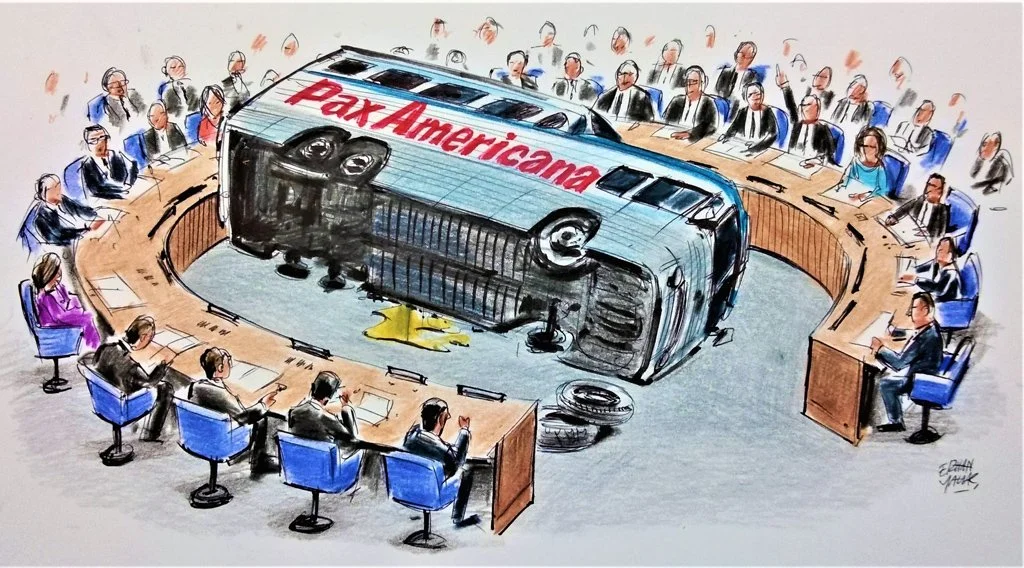Opinion: The ‘Pax Americana’ was Never Real
By Barnaby Woodhouse, Second Year History
The term ‘Long Peace’ refers, unsurprisingly, to a period in history marked by unprecedented levels of peace. Periods of Long Peace have existed for as long as war, from the Pax Romana (c.27-180), the Pax Britannica (c.1815-1914), and now to its newest incarnation, the Pax Americana (c.1945-), but I feel that this concept, particularly the Pax Americana, is worth examining. The invasion of Ukraine by Russia in February 2022 caused many to speculate whether this meant ‘the end of the Long Peace’.[1] [2] [3] However, I feel there is a better question to ask, that being whether this Long Peace was ever actually real.
The Pax Americana is defined as a period of peace since the end of the Second World War and, at first glance, the world really does appear to be more peaceful – the world’s largest economic powers have not gone to war with each other, conflicts involving smaller economies are also declining, international conflicts have fallen from a rate of six a year in the 1950s to one a year in the 2000s,[4] and fatalities have fallen from 240 deaths per million to less than 10 per million.[5] So there we have it, right? Definitive proof that we are living in a time of peace.
I disagree. Firstly, this is a strange definition of peace. ‘Peace’ implies a complete absence of conflict and the threat of it, not merely a lesser amount. I doubt Serbian Prime Minister Nikola Pašić would have labelled the 1914 July Crisis as a peaceful time, despite the only shots fired at that point being those of Gavrilo Princip in Sarajevo. For us to truly claim to be living in a Long Peace, there would have to be total peace. While the last 78 years have certainly been mostly peaceful in Europe and North America, I am not sure the same can be said for south Asia, sub-Saharan Africa, the Middle East, or Latin America. There has been a sharp increase in the number of battle-related fatalities in the Middle East since the Arab Spring in 2011,[6] and these conflicts have been dominating headlines for years – are we meant to look these people in the eye and tell them they are lucky to be living in a Long Peace?
Even worse would be to say they are lucky to live in the Pax Americana, the American Peace, given the role the US has often played in sparking, extending, or escalating this violence. None of these conflicts in the global south have been hailed as the end of the Long Peace; it seems conflicts only threaten the end of the Long Peace when they involve Europeans or North Americans.
At its heart, the Pax Americana is an idea relevant only to the global northwest. American citizens have not been forced to participate in war since the 1960s, a similar story for many in Europe, but people across the rest of the world have not shared in this luxury. The EU won a Nobel Peace Prize in 2012 ‘for over six decades (having) contributed to the advancement of peace and reconciliation, democracy and human rights in Europe’.[7] I must commend whoever thought to specify ‘in Europe’; it would have been strange to present an award for keeping the peace in general to a union where seven member states had only withdrawn forces from Iraq a few months earlier. Even the period’s name itself is centred on the northwest. Putting aside the irony that the Pax Americana is named for the US, which has regularly exacerbated the conflicts that have raged since 1945 (invading Vietnam and Iraq, bombing Libya, funding rebel groups, etc.), one of the undeniable reasons wars have not broken out between the world’s major powers is the existence of nuclear weapons. However, it is not only America that possesses these weapons; Russia, India, Pakistan, China, and North Korea have all shown just as much restraint and care regarding nuclear weapons, yet it is America which gets to take all the credit. Perhaps we ought to consider a rebranding of the Pax Americana? The Pax Nuclear does have a nice ring to it.
Ultimately, I simply find it impossible to reconcile these facts. I cannot accept that we are living in a Long Peace when the world is, by definition, not at peace. Yes, the number of conflicts and war-related deaths may be decreasing. Yes, there may have been no inter-superpower conflicts in almost 80 years. But that is beside the point. The world is objectively not at peace, regardless of what the Pax Americana, and its apparent belief that the only conflicts that truly matter are those that involve the global northwest, would have us believe.
References
[1] Bryan Walsh, ‘The war in Ukraine could portend the end of the “long peace”’, Vox, 26 February 2022 https://www.vox.com/2022/2/26/22951016/russia-ukraine-long-peace-nuclear-weapons-global-development [accessed 9 January 2023]
[2] Steven Pinker, ‘Is Russia’s war with Ukraine the end of the Long Peace?’, The Boston Globe, 2 March 2022 https://www.bostonglobe.com/2022/03/02/opinion/is-russias-war-with-ukraine-end-long-peace/ [accessed 9 January 2023]
[3] Institute of International and European Affairs, War In Ukraine: Is This The End Of The Long Peace In Europe?, online video recording, YouTube, 14 March 2022, https://www.youtube.com/watch?v=CwOcsAHvCjM&ab_channel=IIEA [accessed 9 January 2022]
[4] Lawrence Freedman, ‘Stephen Pinker and the long peace: alliance, deterrence and decline’, Cold War History, 14.4 (2014), 657-672 (p.658)
[5] Human Security Research Group, The Decline in Global Violence: Evidence, Explanation, and Contestation (Vancouver: Human Security Press, 2014)
[6] Walsh, Vox, 26 February 2022
[1] The Nobel Peace Prize 2012 (2023) https://www.nobelprize.org/prizes/peace/2012/summary/ [accessed 9 January 2023]

